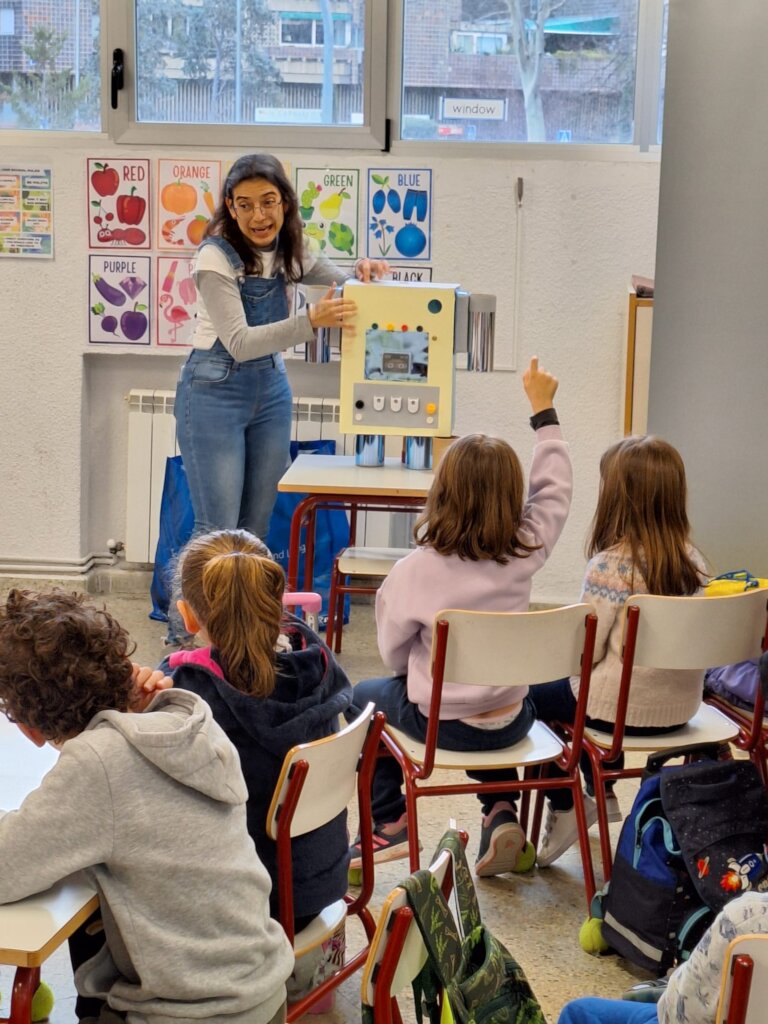By Marijose Rodriguez | Book writer and story teller, Apadrina la Ciencia
Dear supporters,
First of all, we would like to express our gratitude for your donations, which are absolutely necessary to continue working on an important part of the educational objectives of Apadrina la Ciencia: the promotion of scientific knowledge and scientific vocations among children and adults, with the ultimate goal that people value this knowledge in their daily lives and make use of it.
To this end, a few months ago, we told you about the edition of the book called Estrellas Científicas (Women Stars in Science), a children’s solidarity book intended to offer role models to 3-7-year-old children, particularly girls. The book is illustrated and contains rhymed texts about six Spanish women scientists, interviews that can be accessed through QR codes and even a scientific rap and its video clip, which can also be accessed through a QR code (Estrellas científicas).
The interest that this book has aroused has encouraged us to carry out different scientific workshops and storytelling in schools and bookstores and science presentations in high schools. To bring science and, specifically, the role of women scientists today, we have opted for a new storytelling format, in which we characterize ourselves adopting the role of the scientists who are the protagonists of the book and speak in the first person from a personal and professional point of view.
We begin with an introduction to the book, telling the children what it is about and the activities of the scientists portrayed in it in broad strokes. Then we ask the children to call one of the scientists and one of us turns up dressed up as the scientist in question. So far we have played the roles of Elena García Armada, Margarita Salas and María Mittelbrunn. Depending on the scientist we are playing, we adapt the storytelling area by adding elements of the research carried out by that scientist. For example, in the case of Elena García Armada - who has developed the first pediatric exoskeleton for children with neuromuscular pathologies and cerebral palsy - we use a roll-up and a robotic leg prosthesis that the scientist herself has lent us. We also bring a homemade robot built with boxes, cardboard and recycled material that can be easily found in any home, to encourage children to leave their own hand and footprints. Other resources are tools and small robots available in specialized stores, and some other eye-catching details such as robot earrings worn by the scientist who performs these storytellers.
After the warming up, the storyteller gives a more detailed presentation of the scientist she brings to life by talking about what she liked as a child and what encouraged her to become a scientist. After this, she explains to the children, parents and teachers the details of her research. The format is open, children and adults can ask questions at any time and the storyteller - without losing her characterization and always speaking in the first person - answers as if she were the scientist herself. We are able to answer very specific questions thanks to the interviews we had with the scientists featured in the book Estrellas Científicas.
In addition, we have sometimes carried out scientific workshops after the storytelling so that the children could have a good time doing simple experiments themselves and enjoy the excitement of discovery by giving answers to the questions that have been posed. The scientific workshops have focused on different issues (density, states of matter, chromatography, magnetism, surface tension, capillarity, etc.) but always with a common thread connecting the children's own world with the scientific issues to be taught. In this way we make learning more meaningful for the children. For example, we have designed a session of experiments in which we have taught what density is, we have made a chromatography, we have explained surface tension and capillarity and we have spun the whole session with the common thread of color theory (primary and secondary colors, color mixtures, cold and warm colors).
From Apadrina la Ciencia, we are pleased to tell you about this new project since we are convinced that the book and all the activities that we are doing will contribute to science dissemination among children. We also intend to arouse their curiosity, as well as inspire and encourage them to make the world a better place by pursuing scientific careers. But, above all, we expect them to enjoy it!!
Thank you so much for being there and supporting us with your donations.
@font-face {font-family:"Cambria Math"; panose-1:2 4 5 3 5 4 6 3 2 4; mso-font-charset:0; mso-generic-font-family:roman; mso-font-pitch:variable; mso-font-signature:-536870145 1107305727 0 0 415 0;}@font-face {font-family:Calibri; panose-1:2 15 5 2 2 2 4 3 2 4; mso-font-charset:0; mso-generic-font-family:swiss; mso-font-pitch:variable; mso-font-signature:-536859905 -1073732485 9 0 511 0;}p.MsoNormal, li.MsoNormal, div.MsoNormal {mso-style-unhide:no; mso-style-qformat:yes; mso-style-parent:""; margin-top:0cm; margin-right:0cm; margin-bottom:8.0pt; margin-left:0cm; line-height:107%; mso-pagination:widow-orphan; font-size:11.0pt; font-family:"Calibri",sans-serif; mso-fareast-font-family:Calibri; mso-ansi-language:EN-US;}.MsoChpDefault {mso-style-type:export-only; mso-default-props:yes; font-size:11.0pt; mso-ansi-font-size:11.0pt; mso-bidi-font-size:11.0pt; font-family:"Calibri",sans-serif; mso-ascii-font-family:Calibri; mso-fareast-font-family:Calibri; mso-hansi-font-family:Calibri; mso-bidi-font-family:Calibri; mso-font-kerning:0pt; mso-ligatures:none; mso-ansi-language:EN-US;}.MsoPapDefault {mso-style-type:export-only; margin-bottom:8.0pt; line-height:107%;}div.WordSection1 {page:WordSection1;}
Links:
Project reports on GlobalGiving are posted directly to globalgiving.org by Project Leaders as they are completed, generally every 3-4 months. To protect the integrity of these documents, GlobalGiving does not alter them; therefore you may find some language or formatting issues.
If you donate to this project or have donated to this project, you can receive an email when this project posts a report. You can also subscribe for reports without donating.
Support this important cause by creating a personalized fundraising page.
Start a Fundraiser